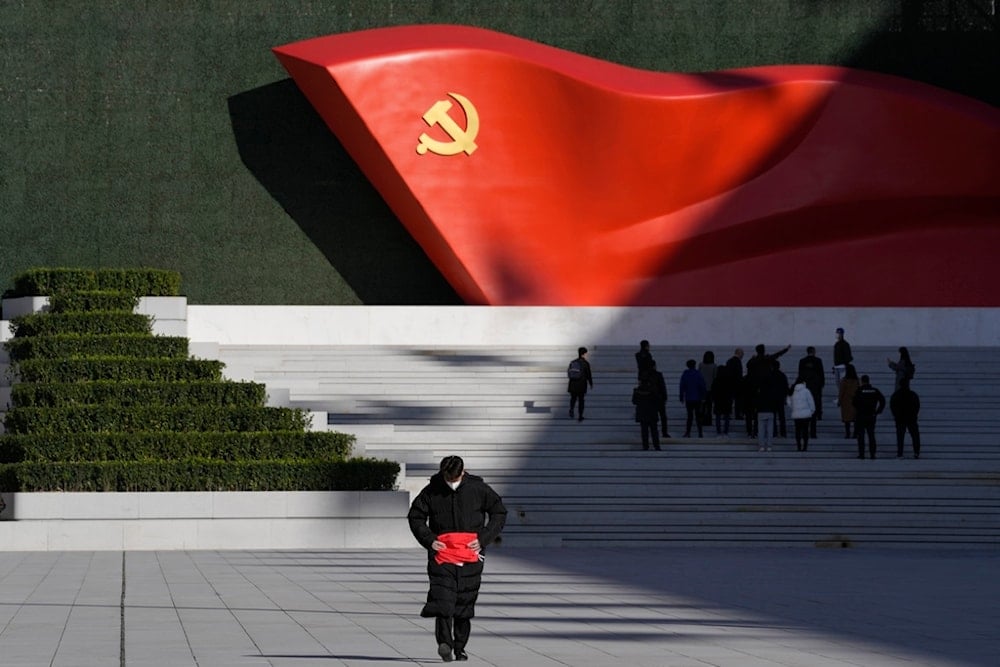China sanctions 13 US defense firms over Taiwan arms deal
The sanctions target 13 US companies, including drone manufacturers RapidFlight and BRINC Drones, as well as six individuals.
-

A worker folds a flag near a giant sculpture of the Chinese Communist Party flag outside the Museum of the Communist Party of China, in Beijing, Nov. 12, 2021. (AP)
China has imposed sanctions on over a dozen US defense firms and several American defense industry executives in response to the Biden administration's recent approval of a $387 million arms package for Taiwan.
The US package reportedly includes spare parts for fighter jets, missile systems, and other military equipment essential for maintaining Taiwan's defense capabilities.
The news sparked sharp criticism from Beijing, which considers the island an integral part of its territory.
In a statement, China's Foreign Ministry accused the US of "seriously damaging China's sovereignty and territorial integrity" through its continued arms sales to Taiwan.
The sanctions target 13 US companies, including drone manufacturers RapidFlight and BRINC Drones, as well as six individuals, such as Barbara Borgonovi, president of Naval Power at Raytheon, and Blake Resnick, the founder and CEO of BRINC Drones.
Symbolic Sanctions
According to the report, the sanctions were implemented under China's Anti-Foreign Sanctions Law.
The law reportedly bars the companies from conducting business in China and prohibit the executives from traveling there.
Read more: Japan, US plan missile deployment for Taiwan contingency initiative
However, analysts suggest the measures will have minimal practical impact, as US defense firms are already restricted from engaging with China under American regulations, according to the New York Times.
Political experts see the sanctions as symbolic, with a potential aim to dissuade defense companies in other countries from supporting Taiwan militarily.
"The PRC under Xi Jinping has been increasingly open to using economic levers to exert pressure on external parties," said Ja Ian Chong, a political science professor at the National University of Singapore.
He added that these moves align with Beijing's broader strategy to isolate Taiwan diplomatically and militarily.
Taiwan Tensions
The arms sales come amid heightened military tensions, including frequent Chinese warplane flyovers and naval around the island.
Washington executed the arms transfer in line with its obligations under the 1979 Taiwan Relations Act, which mandates the provision of defensive weapons to Taiwan, a move the US claims to be necessary for regional stability but which China views as a violation of its sovereignty and interference in its internal affairs.
The sanctions mark another chapter in the escalating rivalry between the two global powers, as both sides grapple with Taiwan's strategic significance and its implications for regional stability.
The actions also signal Beijing's commitment to opposing any foreign support for Taiwan, which President Xi Jinping has called the "core of its core interests," with reunification remaining a central goal—even if force is required.
Read more: Taiwan's Lai discusses 'China threats' with ex-US House Speaker Pelosi
The Biden administration has not yet commented on the sanctions, but the development raises questions about how the incoming Trump administration might approach the Taiwan issue.
President-elect Trump has previously sent mixed signals, calling for increased Taiwanese defense spending while criticizing the island's dominance in the semiconductor industry.
In a July interview, Trump suggested that Taiwan should "pay us for defense," likening US protection to an insurance policy.
In that same interview, he also criticized Taiwan's dominance in the semiconductor industry, implying it negatively impacts American jobs.
Russia in?
On November 25, Russian Deputy Foreign Minister Sergey Ryabkov stated that Russia may consider deploying shorter- and intermediate-range missiles in the Asia-Pacific region.
The announcement followed Japan and the US finalizing a joint military plan to address potential Taiwan contingencies, reportedly involving the deployment of US missile units to strategic locations in Japan and the Philippines—a move likely to heighten tensions with Beijing.
Speaking to journalists, Ryabkov emphasized that deploying such missiles remains a potential military-technical response to US missile deployments in any part of the world. "Our further steps, including what concerns our military-technical response, will depend on the deployment of corresponding US systems in any region of the world," he stated.
Ryabkov also placed responsibility for the current situation and any potential escalation squarely on Washington and its European allies, accusing them of supporting Kiev's "ephemeral ambitions and most criminal designs."

 4 Min Read
4 Min Read








